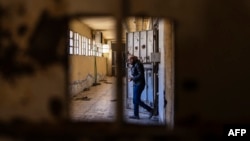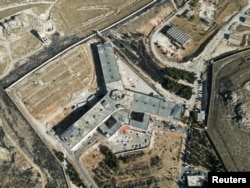A network of secret prisons run by the former Syrian government is more extensive than the U.S. had realized, and is complicating efforts to find American journalist Austin Tice, the U.S. hostage envoy said Friday.
The U.S. government initially estimated Syria had around 10 to 20 secret prisons, but there may be 40 or more, the chief envoy for hostage negotiations Roger Carstens told reporters Friday, following a brief trip to the Syrian capital, Damascus.
“I’ve been rather amazed at the amount of secret prisons that Assad seems to have amassed,” Carstens said, referring to former President Bashar al-Assad. “They’re in little clusters at times. Sometimes they’re in the far reaches of Damascus.”
The scale of the prison network has made it harder to locate Tice, according to Carstens.
A Texas native and former U.S. Marine, Tice has been held in Syria since 2012, when he was detained at a checkpoint in Damascus. Aside from a brief video after his capture, little has been heard or seen of him.
Over the past 12 years, the U.S. government has pinpointed about six prisons where Tice was believed to have likely been, Carstens said. But new information means as many as three more facilities have been added to the list.
Limited resources makes checking them a difficult endeavor, Carstens said. In the absence of sufficient U.S. government personnel on the ground, non-governmental organizations, journalists and Syria's transitional government have been searching for Tice.
“In a perfect world, we’ll find Austin and bring him home, and we’ll stop the search,” Carstens said. “We’re not going to stop until we find the information we need to conclude what has happened to Austin, where he is, to return him home to his family.”
One of the nonprofits involved in the search, Hostage Aid Worldwide, has a team on the ground in Syria. The group’s president, Nizar Zakka, told VOA one barrier is not having enough people to help with the searches.
“It’s ridiculous,” Zakka said. “I need a team.”
In the aftermath of the Assad government’s collapse this month, thousands of prisoners have been released from facilities run by the government. That has raised hopes among the Tice family that Austin will be among them.
“I feel like we’re standing in line, and we’re not the only ones that are still standing in line,” Tice’s mother Debra told reporters Monday. “We just need to get all those prisons opened, get all those families reunited, including us.”
Tice is an award-winning freelance journalist and photographer who worked for outlets including The Washington Post, CBS and McClatchy. He is the longest-held American journalist abroad.
Shortly before the Assad government fell, the Tice family revealed that it had received information from a source vetted by the U.S. government that confirmed Austin was alive and held in the Damascus area.
Last week, Debra Tice wrote to Israeli Prime Minister Benjamin Netanyahu asking Israel to pause strikes in a part of Syria where her son may be held. Debra Tice told the Israeli leader her family had “credible information” that her son may be held in a prison in the mountains outside Damascus underneath a military museum.
Asked whether the U.S. government had received any new information that would reinforce the belief that Tice was still alive, Carstens said, “The information that we have right now doesn't confirm either one way or the other.”
Earlier this month, U.S. President Joe Biden said he believed Tice was still alive and that the United States was committed to securing his release. The president did not elaborate.








